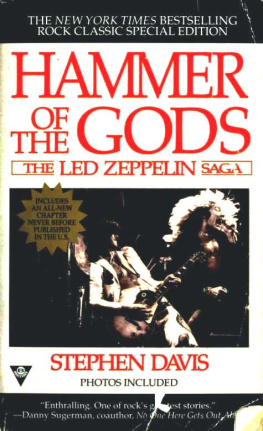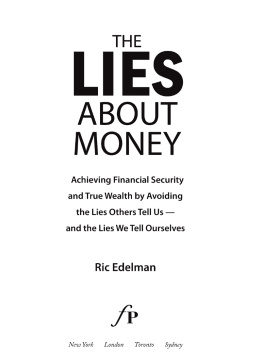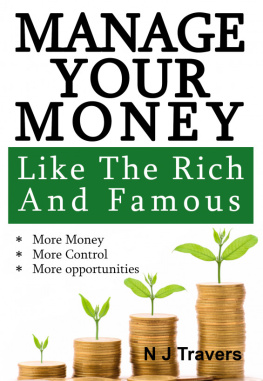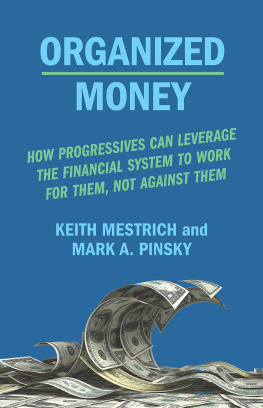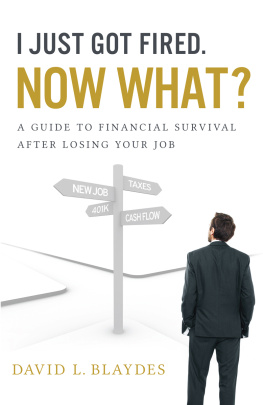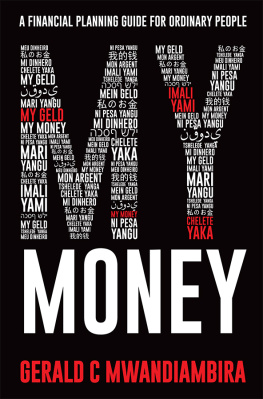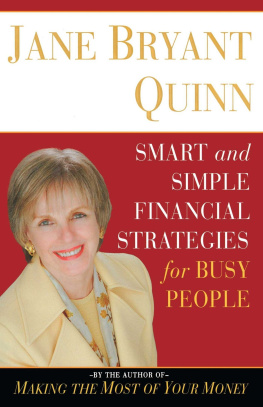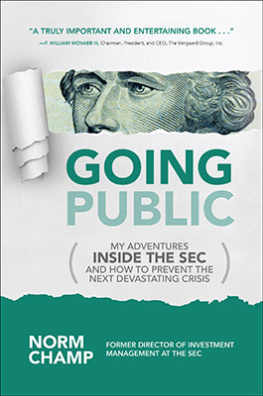What They Do With Your Money
What They Do With Your Money
How the Financial System Fails Us and How to Fix It
STEPHEN DAVIS JON LUKOMNIK DAVID PITT-WATSON

Published with assistance from the Louis Stern Memorial Fund.
Copyright 2016 by Stephen Davis, Jon Lukomnik, and David Pitt-Watson.
All rights reserved.
This book may not be reproduced, in whole or in part, including illustrations,
in any form (beyond that copying permitted by Sections 107 and 108 of the
U.S. Copyright Law and except by reviewers for the public press), without
written permission from the publishers.
Yale University Press books may be purchased in quantity for educational,
business, or promotional use. For information, please e-mail
(U.S. office) or (U.K. office).
Set in Minion type by Westchester Publishing Services
Printed in the United States of America
Library of Congress Control Number: 2015955527
ISBN 978-0-300-19441-8 (cloth : alk. paper)
A catalogue record for this book is available from the British Library.
This paper meets the requirements of ANSI/NISO Z39.48-1992
(Permanence of Paper).
10 9 8 7 6 5 4 3 2 1
Contents
Acknowledgments
No book is the product solely of the authors. We are indebted to the many thousands of people who work in the finance industry and try to do the right thing for their customers and society while buffeted by conflicting interests. They have been our inspiration.
In particular there are a number of people whose thinking and practice have contributed to the ideas in this book. Any new insights we provide are built on their accumulated wisdom. We cannot name them all, but here are some whose efforts have helped all of us to understand and reform the finance industry for the better.
Thanks go to Keith Ambachtsheer, Alissa Amico, David Anderson, Donna Anderson, Mats Andersson, Melsa Ararat, Phil Armstrong, Phillip Augur, the late Andre Baladi, Sir John Banham, David Beatty, Lucian Bebchuk, Marco Becht, Aaron Bernstein, Laura Berry, Kenneth Bertsch, Lary Bloom, Jack Bogle, Glenn Booraem, Peter J. C. Borgdorff, Amy Borrus, Erik Breen, Sally Bridgeland, Steve Brown, Maureen Bujno, Tim Bush, Peter Butler, Ann Byrne, the late Sir Adrian Cadbury, Anne Chapman, the late Jonathan Charkham, Douglas Chia, Peter Clapman, Paul Clements-Hunt, Andrew Cohen, Francis Coleman, Tony Coles, Paul Coombes, Martijn Cremers, William Crist, Ken Daly, David Davis, Matthew de Ferrars, Sandy Easterbrook, Bob Eccles, Michelle Edkins, Ambassador Norm Eisen, Robin Ellison, Charles Elson, Luca Enriques, Fay Feeney, Rich Ferlauto, Peggy Foran, Tamar Frankel, Julian Franks, Mike Garland, Kayla Gillan, Harrison Goldin, Jeffrey Goldstein, the late Alastair Ross Goobey, Jeffrey Gordon, Gavin Grant, Sandra Guerra, Andrew Haldane, Paul Harrison, James Hawley, Scott Hirst, Hans Hirt, Catherine Howarth, Mostafa Hunter, Robert Jackson, Bess Joffe, Keith Johnson, Michael Johnson, Guy Jubb, Fianna Jurdant, Adam Kanzer, Erika Karp, John Kay, Con Keating, Matthew Kiernan, Jeff Kindler, Dan Konigsburg, Richard Koppes, Mike Krzus, Robert Kueppers, Paul Lee, Pierre-Henri Leroy, Suzanne Levine, Emily Lewis, Karina Litvack, Mindy Lubber, Mike Lubrano, Donald MacDonald, Hari Mann, Bob Massie, Michael McCauley, Greg McClymont, Bill McCracken, Alan McDougall, John McFall, Jane McQuillen, Jim McRitchie, Colin Melvin, Bob Meyers, Natasha Landell Mills, Ira Millstein, Nell Minow, Bob Monks, Peter Montagnon, Sir Mark Moody-Stuart, Susan Morgan, Roderick Munsters, Marcy Murningham, Lord Paul Myners, Bridget Neil, Stilpon Nestor, Saker Nusseibeh, Amy OBrien, Matt Orsagh, Norman Ornstein, Barry Parr, William Patterson, Dan Pedrotty, John Plender, Julian Poulter, Mark Preisinger, Tracey Rembert, Iain Richards, Louise Rouse, Allie Rutherford, Sacha Sadan, Nichole Sandford, Kurt Schacht, Andrew Scott, Linda Scott, Joanne Segars, Uli Seibert, Ann Sheehan, Howard Sherman, Jim Shinn, Chris Sier, Anne Simpson, Anita Skipper, Tim Smith, Jeffrey Sonnenfeld, Nigel Stanley, Anne Stausboll, Christian Strenger, John Sullivan, David Swensen, Kenneth Sylvester, Henry Tapper, Jennifer Taub, Paul Taskier, Matthew Taylor, Sarah Teslik, Raj Thamotheram, Dario Trevisan, Mark van Clieaf, Jan van Eck, Alex van der Velden, Ed Waitzer, Kerrie Waring, Steve Waygood, Steve Webb, Andrew Weisman, Heidi Welsh, Kevin Wesbroom, Darrell West, Ralph Whitworth, John Wilcox, Eric Wollman, Simon Wong, Ann Yerger, and Beth Young.
We would also like to thank our spouses and children, our longtime agent, Gail Ross, and our patient and supportive editor, Bill Frucht, and his expert team at Yale University Press.
Finally, this book is dedicated to our parents.
Introduction
We the Capitalists
I f you believe the advertisements, saving money over the long term weaves a reliable safety net, allowing us to retire comfortably, afford a house, or pay for extra care in the event of ill health. Behind the hype, though, our financial system can subject that hard-earned capital to a perfect crime. Undetected, a skein of routine practices can siphon savings from citizen nest eggs. This book is about what theythe investment firms, banks, and pension plansdo with your money once it enters their world. What happens can vary a lot from institution to institution and from country to country, and that in turn makes an enormous difference to our wealth and our welfare.
Consider a story of triplets. At the age of twenty-five, ready to join the workforce full time, Beth moves to Atlanta, Georgia; Cathy heads to London; and Sarah makes a new home in Amsterdam, where financial institutions are different from those prevailing on Wall Street or in the City of London. Each sister earns $60,000 per year, trying to balance the
These huge variances in outcomes occur because small differences in annual charges compound over the years. Here is how it would work. From the age of twenty-five, Beth in Atlanta socks $6,000 annually into a commercial retirement savings plan selected by her employer. Beth can get a 5 percent return and so she could, in theory, have a savings pot of $725,000 when she retires at sixty-five. What she doesnt factor in is fees. The 1.5 percent that she is charged every year reduces her ultimate savings by more than $200,000, to $507,000.
At sixty-five, when she retires, she has a difficult decision. She needs to know she wont run out of money if she lives for a long time. On average, Beth might expect to live another twenty years, until she is eighty-five. But Beth wants to be sure that she will still have an income even if she lives to ninety-five. Assuming she will have to pay the same annual charge of 1.5 percent, Beth will be able to spend just $27,600 each year.
Over in London, Cathy has discovered she has an ultimate pension pot of the same size: $507,000. In Britain, many people buy an annuity that will keep paying no matter how
In Amsterdam, though, Sarah has been enrolled into a giant, low-cost, nonprofit fund that will cover her for the rest of her life. Annual charges are just 0.5 percent, so at age sixty-five she has a pension pot equivalent to $642,000. That gives her an annual payout of $49,400far higher than either of her sisters.
Why the vast disparity? Rather than establish simple, commonsense, low-cost vehicles for collective savings and retirement, such as the Dutch have, financial institutions and policymakers in the United States and United Kingdom have engineered a system that has transformed worker savings into a virtual ATM for the financial industry. Complexity rules; one study tracked no fewer than sixteen different intermediaries escorting the citizen-shareowners money to an investment.
Next page


